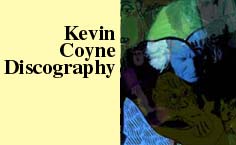
PASCAL's
KEVIN COYNE HOME PAGE 
An article I wrote about every Kevin Coyne albums. It was published in Crossroads, a French Rock magazine in December 2004 a couple of days after Kevin died (although this had been written before). Here is an Engish translation. I did some update recently ("One Day in Chicago" and "Underground").
Kevin Coyne
by Pascal
Regis (English translation by Jim Landon)
Kevin Coyne died of a respiratory illness on December 2, 2004 at his
Nuremberg home, at the age of sixty. Despite forty albums to his name wasn't
Kevin Coyne all but forgotten? He'd gone missing from the racks of most
record shops but was still able to fill the 100 Club in London in October
2004, after a short UK tour. Back in the 70's he was deservedly compared to
some great names: Beefheart, Van Morrison, Joe Cocker, and even Dylan.
One of the
first signings to Virgin, he packed London's Hyde Park in 1974 and made the
cover of NME. Nik Kent showered him with praise... It's just that Coyne's
approach never fitted with the designated record company career path: he was
too demanding, not brainless enough, without enough of the Sid Vicious. He
was just Kevin Coyne, with lyrics as well as a voice, a singer with something
to say. Uncompromising, honest, sensitive, intelligent; a rock critic rolls
out words that aren't supposed to apply to the dumb universe of sex and drugs
and rock and roll...
The comparison with Captain Beefheart is interesting for many reasons. Both men were consumed by an incurable artistic sensibility, with a love of the blues shaping their voices, but while the Captain apparently settled for comfortable dementia, Coyne was clearly engaged from the outset in a struggle against madness. The 1979 Rockpalast show, for example, where a new audience got to know him, displayed such a powerful character, such a disturbing and fired-up live performer that he was immediately classified as a parading lunatic. But there Coyne was only pretending, giving a performance. Better to be mad than sad... Coyne the former mental therapist knew so well how to portray madness that later it did come close to consuming him. In his final years, sane and sober, but ageing and in poor health, Coyne continued his work in the face of indifference contrasted with the deep respect of a handful of fans. His concerts remained absolutely unique experiences that usually left the audience in wonder.
THE "SIREN YEARS"
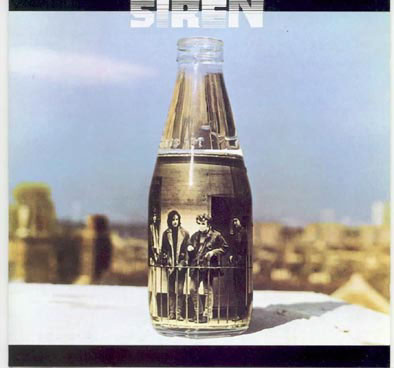
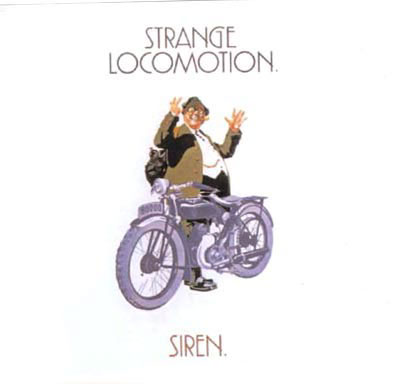
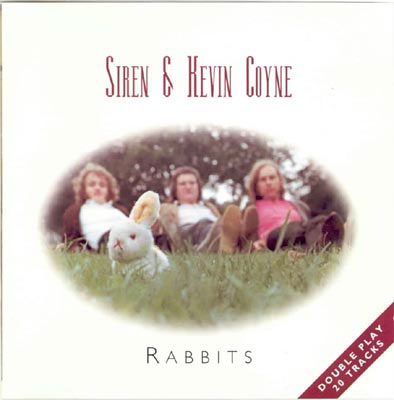
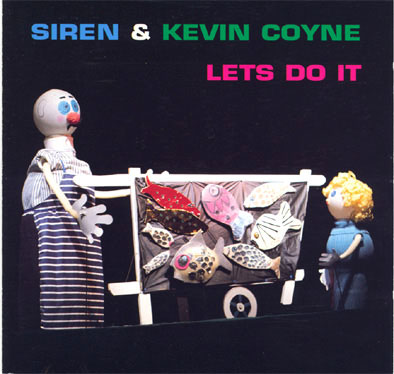
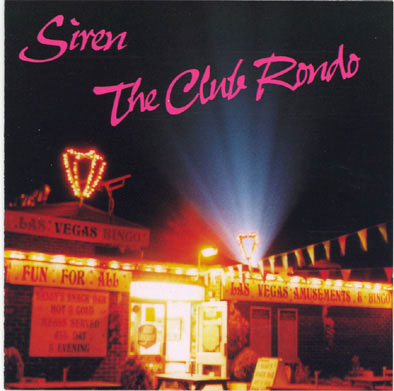
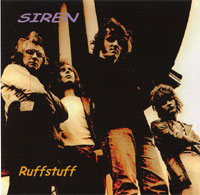
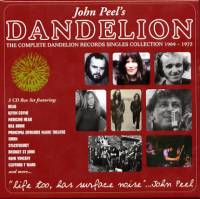
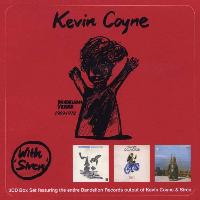
Siren (1969) **
Strange Locomotion (1971) ***
Rabbits (1970) **
Let's Do It (1970) **
The Club Rondo (1970) ****
Kevin Coyne with Nick Cudworth (kbds, gtrs), Dave Clague (bs, gtrs),
John Chichester (gtrs), Mick Gratton (gtrs), Mick Sweeney (gtrs), Tat Meager
(dms), Colin Wood (flute, kbds).
From 1969-71,
Kevin Coyne was the singer with Siren, one of the last bands of the British
blues boom. Initially courted by Blue Horizon, the English blues label that
put Fleetwood Mac on the map, Siren were finally signed by John Peel's Dandelion
Records. In the US, they were handled by Elektra, President and fan Jac Holzman
even considering Coyne for The Doors, the very day after Jim Morrison's death.
Coyne's reaction: "I didn't fancy the leather pants."
Siren and Strange Locomotion are two really good albums of blues and English-style boogie, along with some beautiful ballads, certain of which ("Asylum") already suggest the tormented songs of later solo albums. Nick Cudworth's magnificent piano work leads the group through some tasty boogie-woogie while Coyne puts himself and his lyrics through their paces. He is feeling for his voice. It sounds promising.
In 1994, Siren bassist and producer Dave Clague released three CDs of studio out-takes. Rabbits and Let's Do It explore similar bluesy territory but The Club Rondo is a neglected little masterpiece. It was entirely improvised in one studio session. Cudworth and Clague keep up a monotonous drone while Coyne lets rip with lyrics, sketches, ditties, Bavarian marches and dialogues with comic provincial English accents. Then, suddenly anticipating Case History, comes "Our Jack", the terrible story of a young mental patient, told by his mother. Stupefying and dazzling.
In 2005, Clague released another rather anecdotal outakes album Ruffstuff. Cherry Red Records had the good idea of releasing all the Siren singles in their 2006 John Peel's Dandelion-The Complete Dandelion Records Singles Collection 1969-1972 3 cd-box. Finally, in 2007, Cherry Red Records again issued a wonderfully remastered 3 cd-box: Kevin Coyne The Dandelion Years 1969-1972, featuring Siren, Strange Locomotion + Case History (see below) and a couple of Siren rarities.
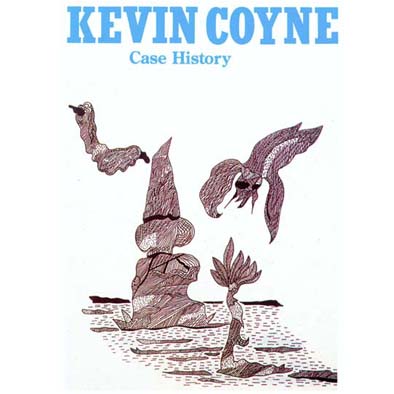
Case History (1972)
Kevin Coyne with Mick Sweeny (gtrs), Nick Cudworth
(gtrs), kbds, Dave Clague (gtrs).
Produced by Kevin Coyne.
"It's not just an album, it's a whole period of my life." Recorded
in an afternoon and a single take in a little Twickenham studio, Case History
is one of those incredible albums that contain such power and intensity they
become almost difficult to listen to. Dandelion released it just as it was,
without embellishment or overdubs (as Jeffrey "Anti-Folk" Lewis told Kevin
when they met in 2004, it is "very low-fi, very raw"). Fuelled by
his experiences as a social worker and therapist, Coyne describes the lives
of the mentally ill, the social outcasts. Solo on most of the songs and accompanied
by members of Siren on the rest, Kevin's delivery immediately sounds as if
he had 20 years of experience behind him. From the beautiful melody of "White
Horse", through the shrill onomatapoeia of "Araby" to the howls of "Mad Boy",
his vocal palette is already of impressive richness and range. The bouncy
"God Bless the Bride" is a reprise of Siren, while the dreamlike universe
of "White Horse" is ostensibly calm and serene, yet somehow awkward. This
dreamy delirium leaves a sense of disquiet but "Uggy's Song", where Cudworth's
pretty arpeggios are replaced by Coyne's savage acoustic strumming, grabs
you by the throat. It tells the life of a black tramp beaten by the police,
who call him Uggy "because they thought he was ugly". The two main poles of
the Coyne Universe are here: a compelling tenderness for his outsider friends
and a revolt against the indifference of the world towards them. So Coyne
remains the social worker, bearing witness. In a few years, cornered by his
own demons, he himself would come close to madness. "Sand All Yellow" recounts
a psychiatric case where Coyne switches voices to evoke patient and doctor,
against a hypnotic backing, all in all quite disturbing. This album marked
the appearance of the trademark minimalist Coyne guitar style: an open-tuned
acoustic across his knees, his thumb barring the strings while his right hand
beat out a frenzied rhythm. ("Evil Island Home" is one amazing example). This
primitive guitar, the fiery voice; the ingredients were there to establish
Coyne as a major artist, one who would later be described as "the only British
musician who ever really had the blues". Blues, yes, but it was provincial
working class blues, grimy pub blues, complete with dominant mother, abused
children, alcoholic father and other horrors: the blues of a certain time
and place. Unfortunately, the demise of Dandelion Records blew any chance
of the record's success. Still, Case History
is one of the greats. It belongs with Syd Barrett's The Madcap Laughs, or Nick Drake's Pink Moon. One of those timeless albums that after
thirty years can still send shivers down your spine.
* * * * *
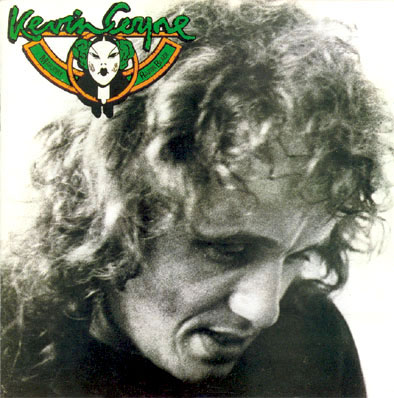
Marjory Razorblade (1973)
Kevin Coyne with Gordon Smith (gtrs, mandolin),
Jean Roussel (kbds), Tony Cousins (bs),
Chili Charles (dms, congas), Steve Verroca (kbds),
Dave Clague (gtrs).
Produced by Steve Verroca.
Wiser after the flop of laid back, hippie Dandelion, Coyne signed with
Virgin Records, then the new "indie" label. Kevin was the second signing,
after Mike Oldfield. It was even suggested that Kevin might add vocals to
Tubular Bells,
which he wisely declined! Backed by Virgin's clout, Coyne was finally about
to show the world what he could do. The album was recorded in a few days at
Manor Studios, initially as demos with Dave Clague from Siren, then with session
musicians assembled for the occasion. Some of them would form the first Kevin
Coyne Band. After Kevin, the album's hero is Gordon Smith, the great acoustic
slide guitarist (he'd released the album Long Overdue on the Blue Horizon label). The sound and cohesiveness
of the album are largely down to him; the arpeggios of "Everybody Says", the
slide of "House on the Hill". Smith is the ideal accompanist; supportive yet
modest, brilliant yet subtle.
Over thirty years on, MRB remains the flagship Kevin Coyne album, delivering some of his most famous songs: the moving "Talking to No One"," Eastbourne Ladies" and "House on the Hill", but also the comic "Karate King" and "Good Boy". Or "This is Spain", a satire of the paranoid British holidaymaker who perceives Spain as primitive and hostile. Hungry for studio time, frustrated by the demise of Siren but sure of his ability, Kevin threw body and soul into this record, a double album of rare inventiveness. He was convinced fame was round the corner and freely declared: "I really think I'm a better vocalist than almost anybody I see on stage" and "I'm quite prepared to take on the whole world." He was also very demanding and unwilling to compromise. The record's opener, for example, where he wails a-capella "Marjory's" morbid lament, must have put more than one listener to flight and helped create his reputation as a mentally ill alcoholic. The Virgin bigwigs probably tore their hair out trying to persuade him to open with the catchy "Marlene". But the stubborn Coyne would always defend the integrity of his work at all costs, even at the risk of scuppering his career.
The album has been reissued by EMI in January 2010 including an extra cd full of rare or unheard songs.
* * * * *

Blame It On The Night (1974)
Kevin Coyne with Gordon Smith (gtrs), Tony Cousins
(bs), Chilli Charles (dms),
Ruan O'Loghlainn (sax), Fi Trench (kbds).
Produced by Steve Verroca.
The unobtainable record. For mysterious marketing reasons this essential
album was only pressed in limited quantities and today can only be found at
crazy prices, being also the sole title excluded from the CD release of Coyne's
Virgin back catalogue in the 90s. Fans still scour the internet in search
of this overlooked
masterpiece, and masterpiece indeed it is. Perhaps less startling than Marjory,
Blame It On The Night
is nevertheless in the same vein. On the one hand there is the folk-blues-boogie
of "I Believe In Love" and "Poor Swine" (and its amazing lyrics where Coyne
feels pity for a coal mine boss facing his employees). On the other, the disturbing
madness of "Witch" or "Don't Delude Me" (is Coyne presenting a clinical case,
or is he himself mad?). The album is again perfectly served by Gordon Smith
and band, a solid blues-rock combo compliant to
every whim of the maestro Coyne. The album begins with the opening cackle
of "River Of Sin", a laugh that some feel was echoed by Johnny Rotten in "Anarchy
In The UK". Rotten later admitted to being a Coyne fan. Rebels Of The World,
Unite.
The album has been reissued by EMI as a download only in January 2010 including bonus rare or unheard songs.
* * *
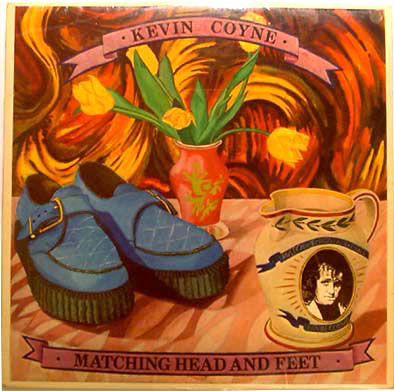
Matching Head And Feet (1975)
Kevin Coyne with Archie Leggett (bs),
Tim Penn (kbds), Andy Summers (gtrs),
Gordon Smith (gtrs, harmonica), Peter
Woolf (dms).
Produced by Geoffrey Haslam.
"The power we had was becoming a little too orthodox. I didn't have the power I needed." The sound of the first two albums was no longer enough. Coyne wanted big venues and a big sound. The spiral that would lead to to a live double album (that inevitable '70s beast) was set in motion, probably stoked by Virgin, who wanted hits and commercial success. The faithful Tony Cousins was replaced on bass by Archie Leggett (ex Kevin Ayers). Gordon Smith stayed, but was buried beneath the sound of Andy Summers (studio guitar-hero just out of Eric Burdon's New Animals) who would bring the house down with The Police a couple of years later. (Kevin always remembered bumping into him in the studio during the recording of Outlandos d'Amour, and chuckling at his new peroxide hairdo : "We thought, this is Andy's last chance to make something." Apropos The Police, Sting is also a declared Kevin Coyne fan). The battle of egos between the two guitarists swang in favour of Summers, who remained to shine alone on the next two albums. Matching Head and Feet is an imperfect album full of gems. While "Saviour" or the marvellous "Sunday Morning Sunrise" always remained live crowd pleasers, songs like "Rock'n'Roll Hymn" or "Tulip", plus the '70s production, leave the album somewhat dated. Still, the critics found it more "accessible" at the time, more "commercial" than Marjory or Blame It, which they considered too "introspective". Geoffrey Haslam had production credits with The Velvet Underground (Loaded), The MC5 and The J Geils Band, but contented himself with simply adding the odd touch of strings or brass.
The album has been reissued by EMI as a download only in January 2010 including bonus rare or unheard songs.
* * *
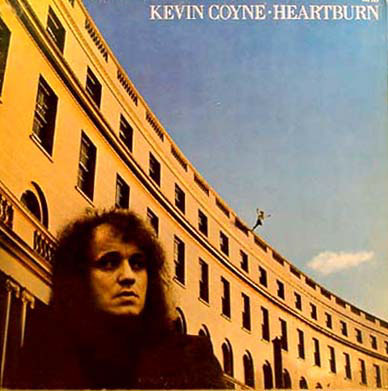
Heartburn (1976)
Kevin Coyne with Zoot Money (kbds),
Andy Summers (gtrs), Steve Thompson (bs),
Peter Woolf (dms).
Produced by Norman Smith.
This album is not unlike Matching Head & Feet, but is more problematic. The coldness
of the sound and the cleaner production rob us of the wild side of Coyne.
"Strange Locomotion", with its pleasant psychedelic imagery, is superb but
is an old Siren number. "America" is both strangely lyrical and comic, while
"I Love My Mother" wallows in thick layers of strings. Most of the songs were
set to benefit from live renditions on the next album. Heartburn is a transitional work that has some
aces in the pack but doesn't quite manage to succeed. The disturbing sleeve
is by Hipgnosis.
* *
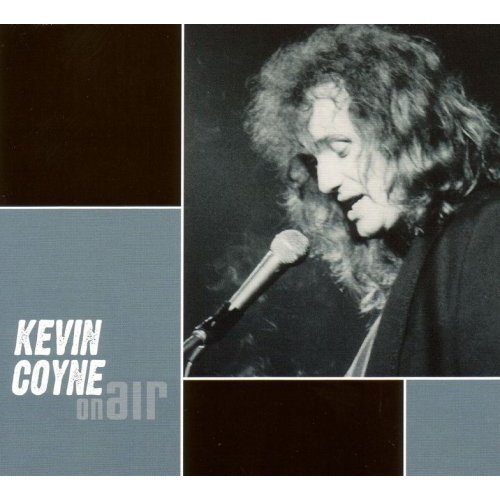
On Air (1975, issued in 20008)
Kevin Coyne with Zoot Money (kbds), Andy Summers
(gtrs), Steve Thompson (bs),
Recorded for German Radio, this album – not unlike the 'In Living Black & White' album – documents the amazing Kevin Coyne band at its peak. Out of the very few cds curently available, this one is highly recomanded
***
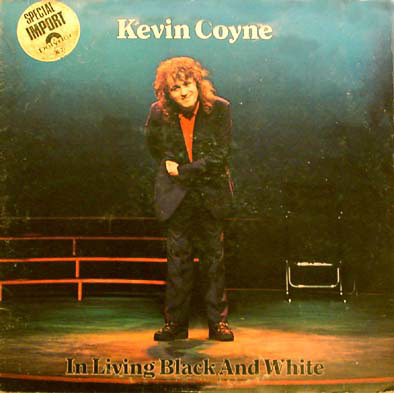
In Living Black and White (live 1976)
Kevin Coyne with Zoot Money (kbds), Andy Summers
(gtrs), Steve Thompson (bs),
Produced by R. J. Lange and Steve Lewis.
One of the best known Kevin Coyne records, with its famous cover (on
the back we find that the smiling Coyne conceals a cut-throat razor..), it
attracted a whole new audience. The concerts were billed as "An Evening With
Kevin Coyne, His Music, His Words, His Band". The band is a perfect whole,
in sound and in power. Summers is a giant, whether with lavish solos, the
frenzied rhythms of "Eastbourne Ladies", or even the acoustic purity of "Big
White Bird". Virgin must have rubbed their hands in glee at three sides of
great rock. Yes, only three, since the first side succumbed to the inevitable
Coyne axiom: when it gets too obvious or easy, do the opposite of what people
expect. So this live double opens with "Case History #2" - an unprecedented
piece, perhaps one of the most astonishing of his career. Accompanied by the
sublime Zoot Money on electric piano, Coyne delivers strange dreamlike texts
and poetical ravings, followed by some grotesque and distressed crooning.
Then come the famous roars of "Fat Girl", with Coyne's primitive guitar lashing
out a furious rhythm. When the full band eventually comes together on a diabolical
Eastbourne Ladies, it is clear that we are dealing with an unclassifiable
artist, a giant personality. Unclassifiable, and unmarketable... Were there
economic reasons that forced the break-up of this group, or did Coyne decide
to take risks again? "The
last band I had was so good I don't think we could do very much more,"
was his comment. Whatever
it was, Virgin were keen to capitalise on the live album but found themselves
on the next tour with only Coyne and Money alone on stage, low-budget music-hall
style. Some memorable TV appearances around this time won more than a few
converts: on the French show Chorus, where he broke the acoustic guitar's strings one
by one, and in Germany on the later, unforgettable Rockpalast, where Kevin pushed theatre to a point
where it was hard to believe he wasn't actually mad. The legend was born.
The album has been reissued by EMI as a download only in January 2010.
* * *
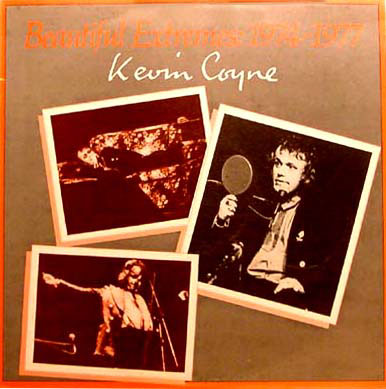
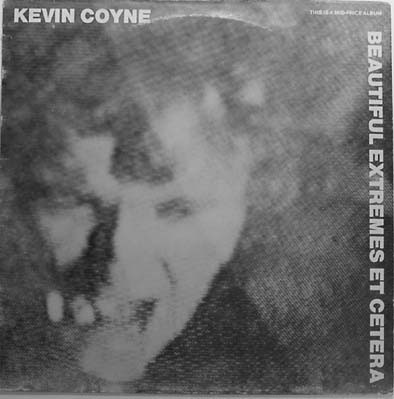
Kevin Coyne solo, and with Bob Ward (gtrs).
* * * * *
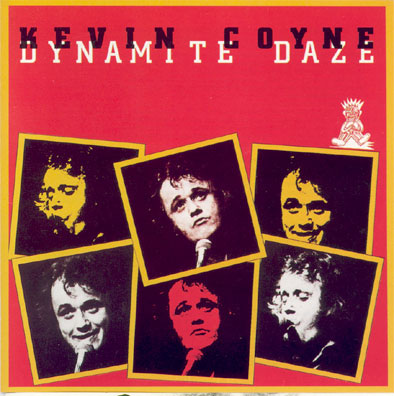
Dynamite Daze (1978)
Kevin Coyne with Zoot Money (kbds), Bob Ward (gtrs),
Al James (bs), Vic Sweeney (dms),
Paul Wickens (accordion, dms, mini-moog, congas)
and Tim Rice (kbds).
Produced by Kevin Coyne and Bob Ward.
Dynamite Daze
is a tremendous album. Coyne burnt his bridges and changed direction radically.
The success that was emerging with In Living Black And White eluded him with this album, which rejected
any easy options and challenged anything that moved. It was recorded in a
tiny London studio (Coyne didn't believe in studio tricks and overdubs, and
prefered to improvise as fast as possible and waste as little money as possible,
so as to keep the rest for himself and his family). The musicians who accompany
him here Ð soon to be McCartney pianist Paul Wickens, for example - were all
flabbergasted to hear him completely change a song's lyrics from one take
to the next. "I never write lyrics down." Each side of the record
opens with a jubilant, aggressive boogie ("Dynamite Days" and "Amsterdam"),
passing onto moving and unnerving ballads ("Lunatic", "I Only
Want To See You Smile", "Are We Dreaming"). The production
is intimate and concentrated compared to earlier albums, with no guitar solos.
The arrival of guitarist Bob Ward, doubling as producer, changed the set-up.
He would stay with Kevin for several years. Lyrically, things were a little
more worrying. "Brothers Of Mine" ("Workers of the world unite
and put the poor boy down") and "I Really Live Round Here"
("You're laughing at my wife... My children are scared") revealed
depths of paranoia no longer concealed by artistic or clinical detachment.
Coyne was
beginning to stumble.
Dynamite Daze
was also a rare example of a '70s artist gleefully welcoming the punk explosion
of '76-77. Delighted by the trouble-making Sex Pistols, Coyne hoped naively
that their healthy slap in the face of showbusiness was about to change it.
The album has been reissued by EMI as a download only in January 2010 including bonus rare or unheard songs.
* * * * *
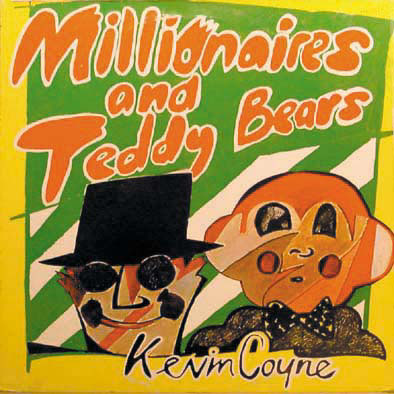
Millionaires and Teddy Bears (1978)
Kevin Coyne with Bob Ward (gtrs), Paul Wickens (kbds),
Vic Sweeney, (dms), Al James (bs).
Produced by Kevin Coyne and Bob Ward.
No more photos, here come the paintings. Coyne, forever a painter,
illustrated all his album covers from here on. Painting had always been a
second form of expression for him but would become especially important in
the 90s, with his first exhibitions in Germany. Millionaires And Teddy
Bears was the logical follow-up to Dynamite
Daze : the same
sound, same atmosphere, and same musicians. "Having A Party" is a head-on
attack against showbiz and the record companies, where Coyne dreams he's trapped
in a hall full of golden discs and someone asks "which one is yours?" - he
has to confess that he "hasn't got a single one at all". In concert, the chorus
of "spot the millionaires" usually became "fuck the millionaires"... Millionaires
And Teddy Bears
was to have been called Women. The album is effectively full of songs dedicated to women. Battered
women, exploited women, a woman who dreams of baking a beautiful cake to throw
at her husband, who responds, "Marigold, you're dreaming...".
* * * * *
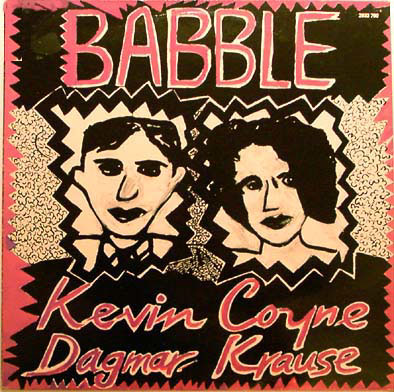
Babble with Dagmar Krause (1979)
Kevin Coyne and Dagmar Krause, with Zoot Money (kbds),
Bob Ward (gtrs), Al James (bs), Vic Sweeney (dms), Paul Wickens (kbds) and
Jerry Decade (kbds).
Produced by Bob Ward.
The fuss surrounding Babble was not about to cure Coyne's galloping paranoia.
As he began staging this musical comedy (written in 1976) with Dagmar Krause
(German art-rock muse, ex-Slapp Happy, Henry Cow, and Art Bears), Kevin had
the bad idea of pointing out that the story of "lovers struggling to communicate"
could have something in common with the lives of Myra Hindley and Ian
Brady, the serial killers whose story had shocked Britain ten years before.
The famous rabble-rousing vulgarity of the British tabloids was immediately
unleashed. They ridiculed the long-haired highbrow who sought to justify the
terrible crimes and the play was eventually cancelled. The record, in the
same musical vein as Dynamite Daze
and Millionaires,
is an ultra-powerful and compact masterpiece (even if Krause's hysterical
soprano put off more than one). Over a three year period, Coyne had released
a stream of progressively stronger songs. He was literally overflowing with
creativity (for England England, another strange musical comedy, that remained unpublished, Coyne
wrote as many as six songs a day!). Add to that the endless touring, record
company pressure, frustration over a lack of commercial success and increasing
alcoholism. Something had to give...
* * * * *
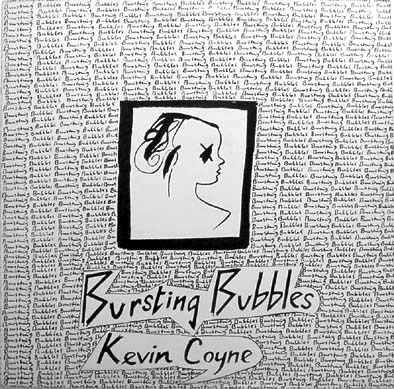
Bursting Bubbles (1980)
Kevin Coyne with Brian Godding (gtrs), Bob Ward
(gtrs), Vic Sweeney (dms), Chris Hunter (sax).
Produced by Kevin Coyne and Al James.
Kevin Coyne apparently suffered several nervous breakdowns and lived
through some tough times at the start of the '80s. Bursting Bubbles with its alarming cover is both unbearable
and magnificent. There were some changes in the line-up, with crucially the
arrival of the magnificent Brian Godding, a little-known jazz-rock guitarist
from the legendary sixties band Blossom Toes. A strong character - Kevin considered
him one of the rare geniuses he had come across but also admitted they had
terrible fights during their collaboration - Godding leads Coyne in a very different
direction from previous albums. The sound is cold, the atmosphere disturbing.
With drum machines, heart-rending sax, and Coyne's improvised moaning, we
are steeped in anxiety as if finally in a true blues record, the artist describing
his pain frankly, without frills. A bizarre and stripped down blues.
* * * * *
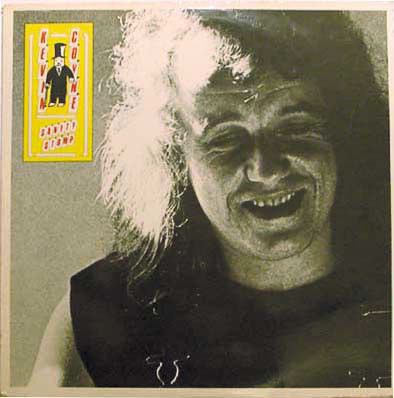
Sanity Stomp (1980)
Disc 1.
Kevin Coyne with The Ruts: Paul Fox
(gtrs), Segs (bs), Dave Duffy (dms), Gary Barnacle (sax) and Paul Wickens
(kbds).
Produced by Paul Wickens.
Disc 2.
Kevin Coyne with Brian Godding (gtrs,
kbds), Robert Wyatt (dms), Bob Ward (gtrs).
Produced by Kevin Coyne.
A double album with no coherent link between the two records. Or perhaps
just a typically uncompromising Coynesque coherence, agreeing to record the
first disc with The Ruts from a "commercial rock-pop" angle, while the second
disc would be a more extreme experiment with Brian Godding and Robert Wyatt...
Always full of ideas, Virgin saw Coyne as a replacement for the recently deceased
Ruts lead singer. Coyne saw it merely as a chance to show that he was just
as punky as any of these youngsters. The result is a strange disc one: not
bad but no great revelation either, although Coyne does well in the role of
punk singer pushing forty. But the real jewel is disc two: it still seems
a shame that Wyatt wasn't invited to sing at all but apparently Kevin's mental
state at this time did not allow him to share the spotlight. Some superb pieces,
built on Wyatt's subtle percussion and Godding's odd arpeggios, provide Kevin
with an amazing and solid backing for some long dreamlike ravings ( "New Motorway",
"Wonderful Wilderness") as well as comic pieces ("My Wife Says" or "The World
Speaks" with its hilarious roll call: "Yoko, peace...cabbages, peace"). The
album ends abruptly with "You Can't Kill Us", a return to plain, aggressive
Coyne blues: " you can say I'm neurotic, say I'm psychotic.. but you can't
kill me".
* * * *
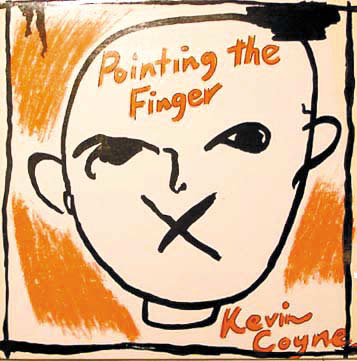
Pointing The Finger (1981)
Kevin Coyne with Brian Godding (gtrs), Steve Lamb
(bs), Dave Sheen (dms), Steve Bull (kbds).
Produced by Kevin Coyne and Brian Godding with G.L.S.
The break with Virgin was followed by another attack of depression. The
sleeve - the autistic painting on the front and the depressing rear photo
- said much about the suffering of the guy. And the music isn't playful either.
Yet, Pointing The Finger is a favourite among fans. It's the
only album recorded with GLS (Godding-Lamb-Sheen, plus Steve Bull on keyboards),
the group accompanying him on stage, a brilliant combo of young musicians
from the jazz-rock scene. Godding is the master of ceremonies and the missing
link between Jimmy Page and Jeff Beck, a monster guitarist capable of the
most sophisticated jazz-rock arpeggios as well as killer riffs ("As I
Recall"). Coyne harnesses all this energy to express his discontent and
carry his lyrics. His sleeve notes, detailing the theme of each song, are
a valuable glimpse into the Coyne creative process. An extremely powerful
album, bearing witness to the schism between rebellion and impotence which
resided in the artist.
* * * * *
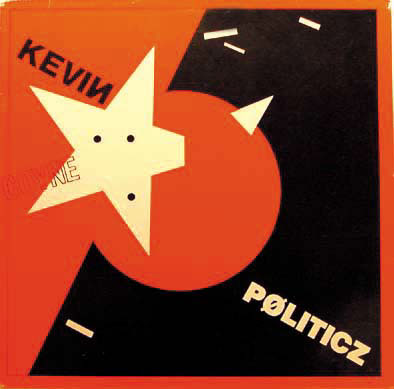
Politicz (1982)
Kevin Coyne with Peter Kirtley (gtrs), Steve Bull
(kbds).
Produced by Kevin Coyne, Peter Kirtley and Steve Bull.
Another good example of the way Coyne used the talents of his sidemen.
Steve Bull offered him some rough synthesiser demos which Coyne seized on.
Refusing to re-record them, he improvised lyrics on top and released the result
intact. The album was completed with songs accompanied brilliantly by Peter
Kirtley on acoustic guitar (he had replaced Godding in the live band). Despite
the electronic-acoustic dichotomy, Politicz works perfectly: Coyne is at the peak of his art.
"Banzai" and "Tell The Truth" are harrowing plunges into the world of madness
over heady techno loops. "I've Got The Photographs" and "Flashing Back" are
examples of precious - and all too rare - acoustic moments in the the Coyne
oeuvre.
* * * *
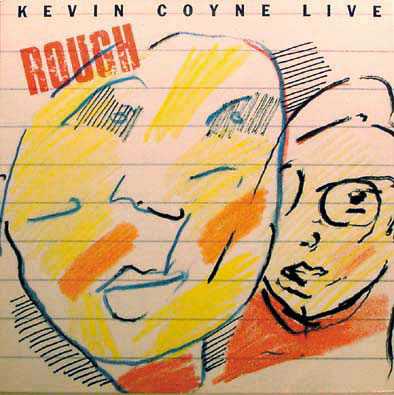
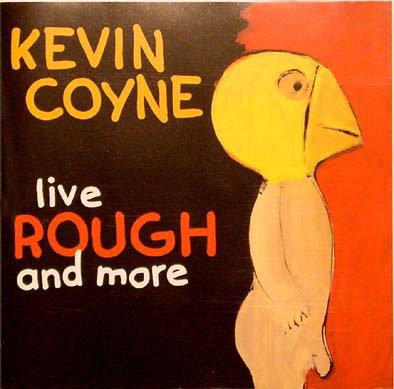
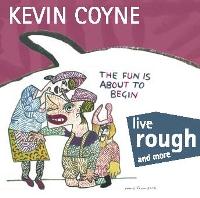 (LP, 1st CD, 2nd CD reissue)
(LP, 1st CD, 2nd CD reissue)
Rough, Kevin Coyne Live (1983)
Kevin Coyne and Peter Kirtley (gtrs), Dave Sheen
(dms), Steve Lamb (bs).
Recorded live at Schauburg, Bremen, Germany, 6th December 1983.
A fantastic band just before the break-up and breakdown. Coyne was
about to collapse under the weight of divorce, alcoholism and depression.
He'd move to Germany with some desperate years ahead. His fans would hear
nothing of him and would file him accordingly - in the forgotten section.
The sound of Rough is powerful, with Kirtley's guitar and
his inspired solos, and rhythmically perfect: Lamb is a virtuoso of the fretless
bass. Coyne revisits "House On The Hill" and "Pretty Park"
in forceful and lyrical style, and lets rip with "Monkey Man", and
a mutilated version of "Lucille". Disappointingly short as an LP
but the '90s CD reissue restored several unreleased numbers.
* * *
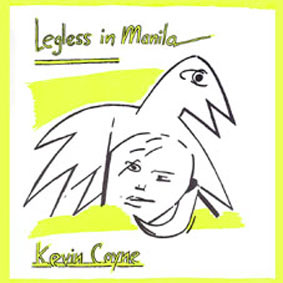
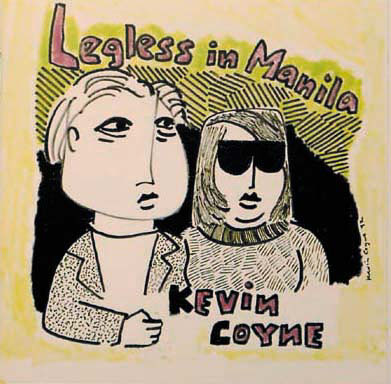 (LP, CD)
(LP, CD)
Legless In Manilla (1984)
Kevin Coyne with Dave Sheen (dms), Steve Lamb (bs),
Pete Hope-Evans (harmonica).
Produced by Kevin Coyne.
Released on his own label ( "Collapse", which duly collapsed immediately),
Legless In Manilla is a superb if rather forgotten album. The absence
of a guitar soloist (Coyne and Kirtley no longer getting on... how many musicians
did Coyne exhaust in this way?) makes it one of the bluesiest Kevin Coyne
albums. "Big Money Man" and "Money Machine", are almost solo Coyne. The album's
big moment is the superb hypnotic lament of "Gina's Song". The blues are well
balanced by the good old improvised ravings of "Zoo Wars" or "Raindrops On
The River".
* * *
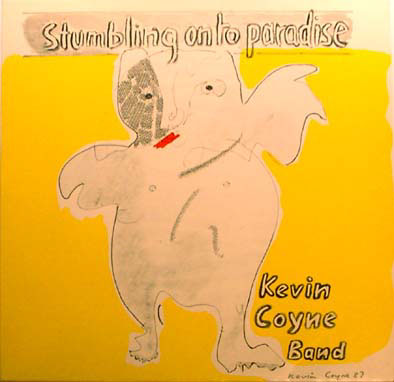
Stumbling Onto Paradise (1987)
Kevin Coyne with Hans Pukke (gtrs), Robert Steinhart
(bs), Falk Steffen (dms).
Produced by Hans Pukke, Kevin Coyne and Wolfgang Eller.
The first German album, which passed almost unnoticed at the time due
to lack of distribution. In retrospect, this isn't such a bad one, it's the
next albums that are really poor.. Still, the clean break between this and
earlier albums, the violent immersion into a sound overworked by neat studio
musicians is hard to take for a Marjory Razorblade fan. If "Tear Me Up" and
"Victoria Smiles" manage to explore new avenues, the rest succumb to some
disheartening clichŽs ("Back Home Boogie", "How Is Your Luck" ).
* *
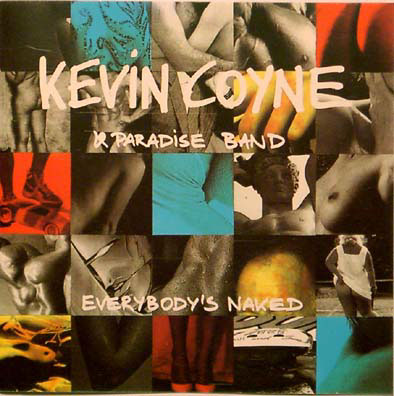
Everybody's Naked (1988) *
Kevin Coyne with Hans Pukke (gtrs), Robert Steinhart
(bs), Falk Steffen (dms) and Henry Beck (kbds).
Produced by Hans Pukke and Wolfgang Eller.
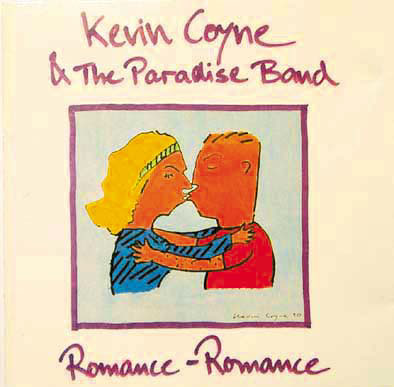
Romance-Romance (1990) *
Kevin Coyne with Hans Pukke (gtrs),
Henry Beck (kbds), Friedl Pohrer (bs), Martin Mueller (dms).
Produced by Hans Pukke and Wolfgang
Eller.
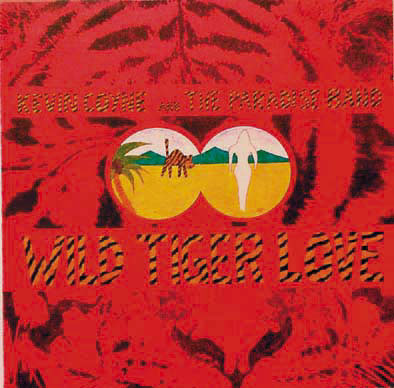
Wild Tiger Love (1991) *
Kevin Coyne with Hans Pukke (gtrs), Henry Beck (kbds),
Friedl Pohrer (bs), Martin Mueller (dms), and special guest Norbert Nagel
(sax).
Produced by Hans Pukke and Charlie Bauerfeind.
Nothing could be further from earthy Coyne blues and studio improvisation than the meticulous
chill of the German musicians who formed the Paradise Band from 1985 to 1992.
However, they don't deserve a stoning. On arrival in Nuremburg, Coyne was
a depressed, alcoholic wreck, a virtual tramp. He was divorced, had abandoned
England, had no guitar and lived in a squat. The local musicians' association
got him playing in return for food and board, to stop him from drinking everything.
They formed a group around him made up of the best musicians in the area and
eventually managed to straighten him out. Without all those fine people -
particularly his second wife - Kevin would probably have paid with his life.
Depressed and disinterested, he recorded three poor albums with these guys,
without much conviction. In contrast to earlier albums, where he controlled
the musicians, taking the best of each and "Coynifying" it, here he was merely
strolling. "The most important thing was to get what they call a good
studio sound. What the hell is that? I've never known, and I've never found
out!" Super clean, with ordinary music, these
discs have next to nothing memorable about them, even if hard-core devotees
perhaps find traces of former genius within the syrup or the hard teutonic
middle-of-the-road. ("Take Me Back In Your Arms", "The Bungalow Song"). This
was apparently a necessary step in escaping from the abyss.
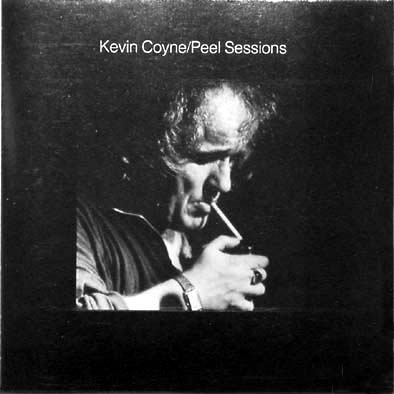
Peel Sessions
(compilation 1973-1990)
Attention, masterpiece! John Peel was always a fan, first signing Coyne
to Dandelion records, then continuing to invite him regularly to BBC sessions.
Coyne often brought along new songs, unreleased versions or improvisations.
This collection is superb (but very incomplete - there is enough quality material
in the archives to fill 4 CD's). This album covers the Marjory and Matching line-ups (the improbable and clownish
"Dance Of The Bourgeoisie"), through to Bob Ward let loose on electric guitar
("That's Rock'n'Roll", a homage to punk to take your breath away), by way
of poignant ballads often invented on the spot ("Do Not Shout At Me Father"
or the harrowing "Rivers Of Blood"). Coyne shows himself, for those who missed
him on stage, as an incredible performer. The lucky ones who saw him improvise
on stage with the playful Jeffrey Lewis in February 2004 in Paris had proof
that age and illness never diminished his stage presence.
* * * * *
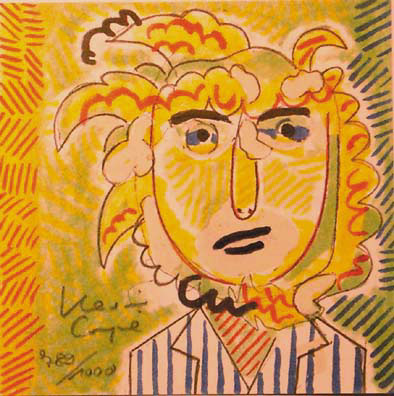
Burning Head (1992)
Kevin Coyne with Hans Pukke (gtrs, kbds) and Robert
Coyne (gtrs).
Produced by Hans Pukke.
What a daft idea! Coyne had returned to painting and by the start of
the '90s his German exhibitions were going pretty well. So record company
Rockport suggested he release his next album as a limited edition of 1000,
including an original artwork with each copy, at a price of.... 350 deutschmarks!
Suffice it to say
that over ten years later the 1000 copies are still not sold out (notice to
converts: negotiation possible..). Burning Head was a turning point. Most of it is like
earlier German efforts, dominated by Hans Pukke and his immaculate, insipid
production, but Coyne was waking up and penned several songs with his rudimentary
guitar accompaniment of old. Burning Head also marked the appearance of Robert
Coyne, Kevin's second son, who would soon aid his father's musical reawakening.
"Hope The Devil Don't Come" has a flavour of Springsteen, and "Totally Naked"
is 100% Coyne. He would soon be back!
* *
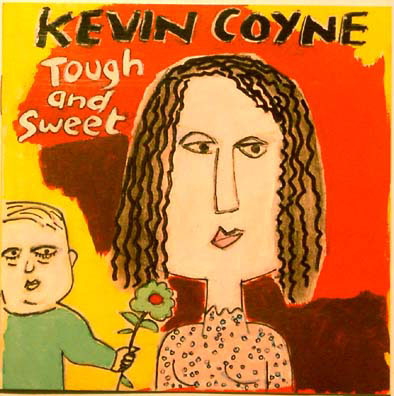
Tough And Sweet (1993)
Kevin Coyne with Henry Beck (kbds), Robert Coyne
(gtrs, kbds, dms, bs), Eugene Coyne (vocals), Hans Pukke (gtrs, kbds).
Produced by Kevin Coyne and Henry Beck.
Tough And Sweet confirmed the comeback. With the help of his two sons, Coyne returned to basics. Soulless virtuosity was on the
way out, along with impersonal production. Kevin was once more provided with
the necessary backing for his improvisations. Robert is a basic guitarist,
the rough sound of his Les Paul recalls Bolan. Kevin was back in form. "Let's
Get Romantic", a duo with his older son Eugene, is a joy. Hans Pukke and Henry
Beck still provided their compositions, unbalancing the album somewhat, but
this kind of fire and ice had become familiar in a Coyne album. Things were
back on track: Tough And Sweet
already anticipated the excellent Sugar Candy Taxi.
* * *
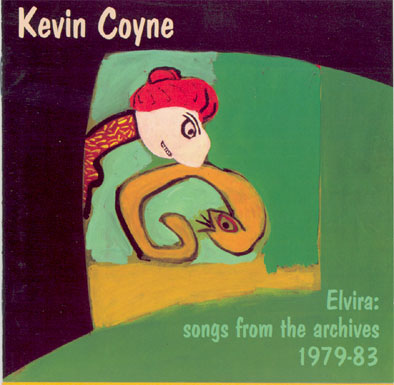
Elvira / Songs from The Archives (1979/1983)
Elvira: Kevin Coyne with Bob Ward (gtrs).
Produced by Kevin Coyne.
Archives: Kevin Coyne with Brian Godding (gtrs),
Steve Bull (kbds), Martin Normington (sax), Dave Sheen (dms), Steve Lamb (bs).
Produced by Kevin Coyne and Bob Ward.
In 1994, Rockport had the good idea of releasing some old, unheard
tracks. Elvira
is a musical comedy in the Babble mould. Here are the simple demos sung by Kevin and it's a real treat
to discover these '70s gems. The songs From The Archives date from 1983 and it's easy to understand why
no label released them at the time. They spring from probably the maddest
Coyne period. The musicians improvise and Coyne screams. It's Beefheart territory,
tough.
* * *
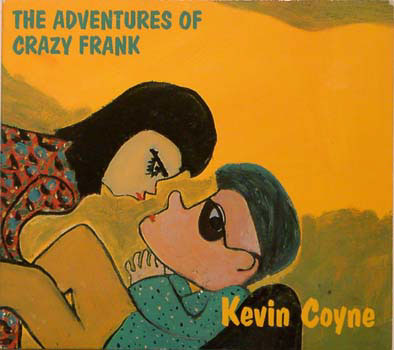
The Adventures Of Crazy Frank (1995)
Kevin Coyne with Friedl Pohrer (gtrs, bs, kbds),
Werner Steinhauser (dms), Henry Beck (organ), Willi Pichl (oboe), Keili Keilhofer
(gtrs).
Produced by Friedl Pohrer and Kevin Coyne.
Coyne was always fed by English music-hall tradition (for example in
the hilarious old songs "Karate King" or "Good Boy" as
well as in the theatrical flavour of his performances). The Adventures
Of Crazy Frank is a complete piece inspired by the
life of Frank Randle, the alcoholic English comedian of the '40s and '50s. Coyne, who was
attending Alcoholics Anonymous, turned over a page of his past in telling these
stories of the DT's and broken marriages, all in good humour. Crazy Frank is a pleasant acoustic album, and ex-Paradise
Band bassist Friedl Pohrer reveals himself as a good accompanist, discreet
but effective.
* *
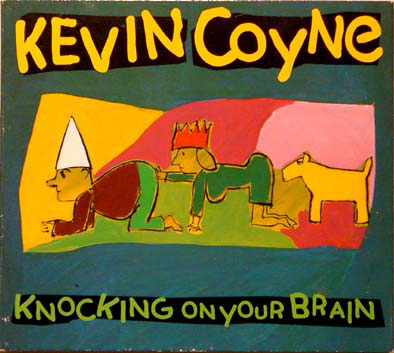
Knocking On Your Brain (1996)
Kevin Coyne with Gary Lucas (gtrs),
Tom Liwa (synthesizer), Ali Neander (gtrs),
Wily Wagner (bs), Ralf Gustke (dms,
percussion), JŸrgen WŸst (organ, kbds),
Constanze Posth (cello, saxophone).
Produced by Ali Neander and Kevin Coyne, co-produced by
Tom Liwa.
A step backwards, although Knocking On Your Brain got a good press at the time, mainly
thanks to the presence of Beefheart guitarist Gary Lucas, who co-wrote two
titles, "Wonderland" and "English Rose". The other musicians were top German
session-players who
jammed together, leaving Coyne free to improvise at will. The results were mixed, and some terrible
gaffes (the awful
German reggae of "Aching Heart") ruin a double CD where greater selectivity
should perhaps have reduced it to a single disc.The fine autobiographical
ballad "Weirdo" is notable.
* *
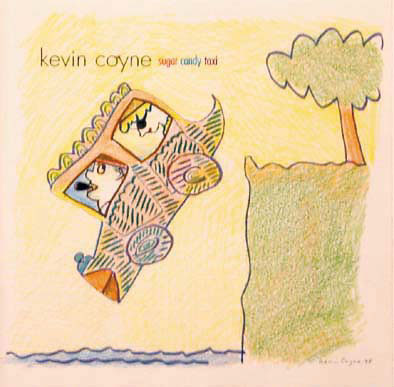
Sugar Candy Taxi (1999)
Kevin Coyne with Robert Coyne (kbds, gtrs, dms),
Eugene Coyne (vocals, kbds),
Hans Raths (sax, flute), Alexander BŠtzel (dms).
Engineered by Thomas Adapoe.
"My most honest record in years." Robert Coyne had a free hand and
co-wrote all the songs. His almost naive style sets the tone of a charming
album, the most effective of all Kevin's '90s output. Robert embellishes the production with
some beautiful layered organ that lends a pleasing subtlety to the title track (a jokey incident
involving Al Capone). Besides some pleasant and effective boogie ("My Wife's
Best Friend" and "Happy Little Fat Man", which Kevin usually dedicated to
himself on stage), the album also marked the return of barmy numbers ("Almost
Flying", and "Fly"), and solo ("Porcupine People").
* * * *
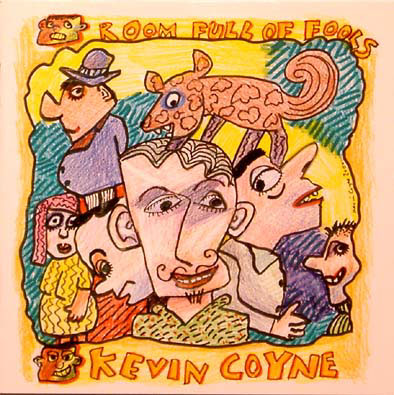
Room Full Of Fools (2000)
Kevin Coyne with Robert Coyne (gtrs, bs, kbds),
Steve Smith (dms), Werner Steinhauser (dms).
Produced by Kevin Coyne and Robert Coyne.
Engineered by Thomas Adapoe and Ben Elliot.
A worthy successor to Sugar Candy Taxi, this album drives home the
point. The title track is again an effective T. Rex-type boogie. Strange songs
alternate with nice nostalgic ballads. A pleasingly similar flavour to its predecessor has Coyne in
good form improvising in the studio again ("The Einstein Song", "Whispering
Desert").
* *
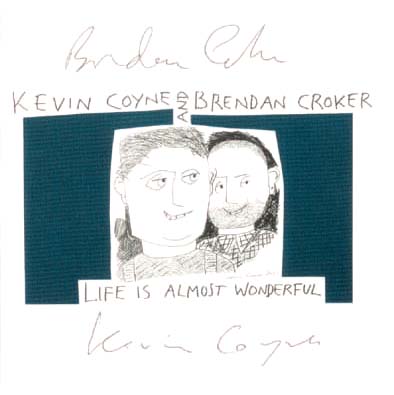
Life Is Almost Wonderful with Brendan Croker (2002)
Kevin Coyne and Brendan Croker (acc gtrs).
Recorded by Werner Steinhauser (Nuremberg) and Bruce Wood (Leeds).
Why this one didn't win a four star rating in all the rock (or folk)
magazines and a place among the classics of 2002 is a mystery.. except that
a complete absence of distribution didn't
exactly help. Also the CD was only sold - expensively - at concerts by the duo. If they had
set out to be invisible they couldn't have planned it much better. Coyne and
Croker - who has played with Clapton and Knopfler - are two artists not bothered
about record
company deals, distribution and other practical matters. Never mind, the main thing is this marvellous
acoustic album. Although "recorded by post" (Croker sent the basic
guitar tracks and
Kevin improvised the lyrics on top), the album is an amazing symbiosis, as
if the two were on exactly the same wavelength. The promotional tour also
confirmed this: it was a joy to see Croker guffawing at Kevin's rants. There
are too many great titles to detail here. Life Is Almost Wonderful is a masterpiece where Coyne, with Croker's
acoustic backing (some lavish guitar-harp included), conjures up wartime memories,
the '50s of his childhood, catholic schools and other peculiar subjects such
as the multicoloured eyes of parrots and the story of an English clerk trying
to dig through his garden to Australia.
* * * * *

Carnival (2002)
Kevin Coyne with Robert Coyne (gtrs, kbds), Werner
Steinhauser (dms), Michael Lipton (gtrs).
Produced by Kevin Coyne and Robert Coyne.
Carnival
is in the same vein as Sugar Candy Taxi and Room Full Of Fools but the songs are perhaps a little less
easy. It marked the arrival of American Michael Lipton, a fine guitarist who
played with Coyne on his US tours (Kevin had only begun performing in the
US about ten years earlier, to polite indifference..). Lipton would also appear
on the next CD and here contributes "Charlene", a fine ballad. Robert leads
his dad in an improbable quasi-techno reprise of "Rolling And Tumbling" that
is quite effective.
* * *

One Day In Chicago with Jon Langford & The Pine Valley Cosmonauts (recorded 2002, issued 2005)
Kevin Coyne with Jon Langford (vocals, guitar), Robert Coyne (guitar, drums), John Rice (guitar, mandolin, bazouki), Pat Brennan (keyboards), Tom V. Ray (bass, guitar), Dan Massey (drums), Lil' Willy Goulding (drums), Dave Alvin (guitar), Dean Schlabowske (vocals).
Tracks 1-11 recorded at Western Sound Lab, Chicago, IL, Dec 2002 by Ken Sluiter.
Tracks 12 -14 recorded live at the Old Town School Of Folk Music, Chicago, Dec 15 2002.
Produced by Jon Langford
Invited to play a show in Chicago by his old friend Jon Langford (of Mekons fame), Coyne agrees to spend time in the studio with Langford musicians. In a frenzied session, Kevin rushes into an amazing and endless improvisation the musicians just have to follow. The bonus tracks recorded live make of this One Day in Chicago an excellent album, a proof how Coyne had lost nothing of his creativity and edge only two years before he died.
* * * *
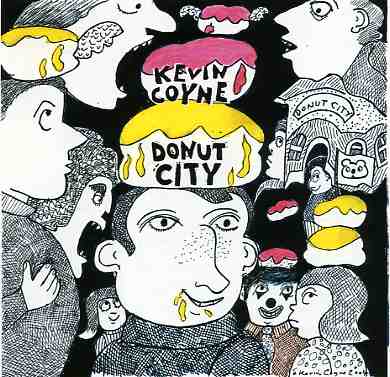
Donut City (2004)
Kevin Coyne with Robert Coyne (kbds), Andreas Blüml
(gtrs), Michael Lipton (gtrs), Harry Hirschmann (bs), Werner Steinhauser (dms),
Andrea Fleissner (backing vocals).
Produced by Kevin Coyne et Werner Steinhauser.
For Kevin Coyne fans this album is a real celebration, kind of a collection
of his various strengths. For others it's the perfect disc to discover a character
with his creativity intact despite age and ill health (Coyne, 60, was one year into a respiratory
illness but his voice remained undiminished). In full control of his skills,
Coyne controls the album perfectly form start to finish. The sound is plain,
the musicians working only to enhance the voice and lyrics. This band was
also his last stage combo: Andreas Bluml, Harry Hirschmann and Werner Steinhauser,
who also co-produces. They are joined on a few tracks by Robert Coyne, again
contributing some of his slightly
troubled, hypnotic pop tunes, and Michael Lipton, who closes out the album
banging on his reverb unit. But Coyne is the star. The incredible vocalist,
the songwriter with lyrics that are personal, distressing, alarming or just
plain crazy. He composed several songs on the piano, and he had a very personal
playing method. To use the Beefheart analogy again, Kevin played piano as
the Captain used to play sax. Musically, we run through all aspects of his
talent. Acoustic blues-rock, with the trademark basic strumming. "No More
Rain", a kind of country-pop ballad recalling the classic "Marlene". Then
a swerve into pure delirium with the eerie "I Hear Voices" or the pure madness
of "Come Back Home", a gospel prayer backed by fisted, distorted piano. Not
to forget "Big Fat Bird", with the Coyne speciality of a background voice
repeating a rhythmic phrase throughout the song, reminiscent of the unforgettable
"Mona Where's My Trousers". "Crocodile" works as a metaphor for his illness,
while the superb "Smile Right Back" is worthy of Beautiful Extremes.
It all defies any kind of labelling. It's just Kevin Coyne. It shifts from
blues to avant-garde without warning. As on most of his albums, Coyne improvised
both music and lyrics in the studio, so that the musicians recorded their
parts after the vocals: a back to front world. He often sang "I'm Still Here!"
He was almost forgotten, playing small venues and selling few discs but he
didn't care. He knew his worth and he carried on. He left us at his artistic
peak. Let yourself be moved.
* * *
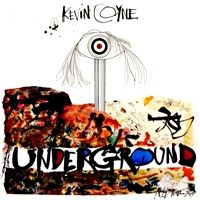
Underground (recorded 2004, released 2006)
Produced and engineered by Werner Steinhauser for Coyne-Steinhauser Productions.
As with any posthumous record, one wonders how the artist would have wanted the final product. Compared to the roughness of One Night in Chicago, there are here some pretty arrangements and backing vocals as well as some rather weak songs. Still, two songs will stand as Kevin Coyne's testament: "Underground" and "Baby Billy" will be remembered as beautiful and moving songs by an artist lucidly facing the idea of his death.
* * *
Also:
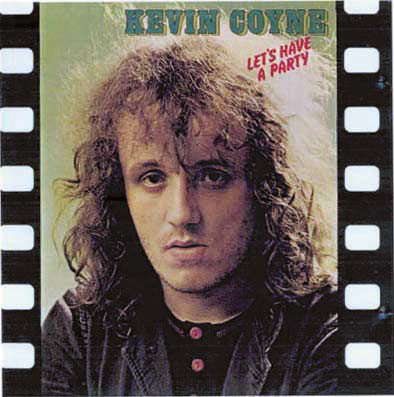 Let's
Have A Party (compilation 1973-76)
Let's
Have A Party (compilation 1973-76)
An LP compiled
from a few singles, plus live tracks from the Heartburn era on the B-side.
Non-essential,
and virtually unobtainable anyway.
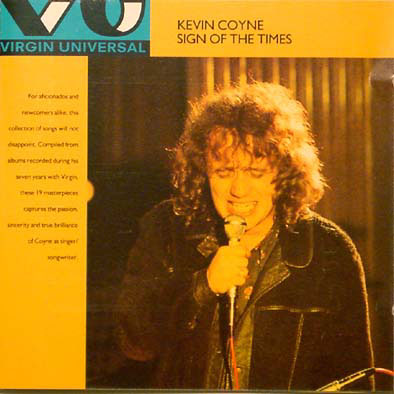 Sign
Of The Times (compilation
1973-80)
Sign
Of The Times (compilation
1973-80)
This CD is
a fine collection from the Virgin years, with several titles from Blame
It On The Night.
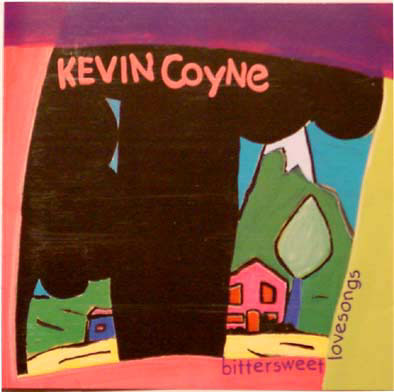 Bittersweet
Love Songs (compilation
1984-95)
Bittersweet
Love Songs (compilation
1984-95)
A compilation
from the German period that you might do well to carefully avoid.
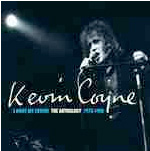 I want my Crown - The Kevin Coyne Anthology - 1973-1980 (compilation)
I want my Crown - The Kevin Coyne Anthology - 1973-1980 (compilation)
The perfect anthology, compiled in 2010 by Kevin's sons Eugene and Robert. A 4-CD box set.